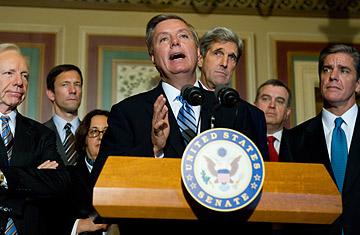
Senator Lindsey Graham, center, speaks to the media following a meeting with CEOs about climate change at the US Capitol in Washington, DC, on December 3, 2009.
(2 of 2)
And this year, Graham has found himself a popular man with Democrats. While he wouldn't consider signing on to health care reform, he got together with Senator Ron Wyden, an Oregon Democrat, to co-sponsor an alternative health care bill. He crossed party lines to become the sole Republican supporter in the Judiciary Committee of Sonia Sotomayor, Obama's nominee to the Supreme Court. And he's been reaching out to Dems on social security reform and immigration — an issue expected to be tackled next year. Do a search on Congress's legislative database and more than 200 hits come up for bipartisan amendments and resolutions co-sponsored by Graham this year alone. "He's very good, very willing, very open, very helpful to try and reach bipartisan solutions," says Senate Armed Services Committee Chairman Carl Levin, a Michigan Democrat who has worked with Graham, who sits on that committee, on a number of amendments this year.
When House Speaker Nancy Pelosi told the White House on Nov. 25 they could not rely on Democratic support for the President's plan for Afghanistan, Emanuel approached Graham. The Senator told Emanuel the troop number needed to "begin with 3" and have the backing of the generals to win Republican support. But when the 30,000-troop increase came with a withdrawal timeline, Graham was taken aback. The White House is now working to reassure him the deadline is not a hard one. Still, Graham is encouraging his colleagues to sign on. "I hope that Republicans can see fit to support the President's surge," he says. And most do.
But where Graham is really stepping up is on climate change. Without Graham's support the bill would likely have already died in the Senate. The idea of passing what most Republicans call a "massive new energy tax" on top of already record federal spending, especially less than a year before midterm elections, has little appeal to folks on either side of the aisle: except for Graham, no other Republicans have endorsed a cap-and-trade system for carbon dioxide, and Dems are worried that passing it alone, a la health reform, will hurt them next November. And yet Graham, who was once such a climate change skeptic that he voted against McCain's global warming bills in 2003 and 2005, is pressing ahead and, amazingly, seems within reach of a deal. Ironically Graham credits McCain, who has since turned his back on the process, with turning him around. "Lindsey's been courageous," says Senator John Kerry, who has been working with Graham to put together legislation. In return for his support, Graham has won support for nuclear power — South Carolina has seven reactors with another four scheduled to be built — as well as clean coal and tougher language on China and India's involvement in the international process.
Graham's Republican colleagues have grown to trust his leadership, which is why he can boast that if he signs on to the final climate bill, several other GOP senators will follow. "I'm fairly confident that there's a point that he won't go past and there's a question of whether that's a satisfactory ending point for the debate," says Senator Richard Burr, a North Carolina Republican. Graham, after all, knows when to draw the line. Earlier this year he was the only Republican willing to work with the Administration to close Guantanamo. But when the Administration, over his objections, decided to bring detainees to trial in federal court, he walked away.
Make no mistake, Graham's conservative credentials are rock solid. He has a 90% rating from the American Conservative Union. The only difference is he's willing to look for compromise. "Two senators from opposite parties sat down today and discussed solving a problem," Graham says with a wry shake of his head, "the fact that that's news is sad. That's where we've come as a country. That's why the [approval rating of] Congress is at 25%."
